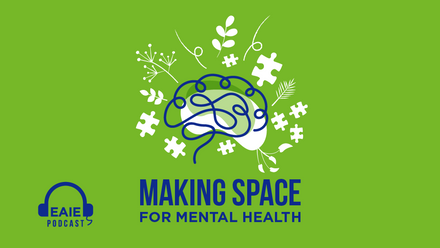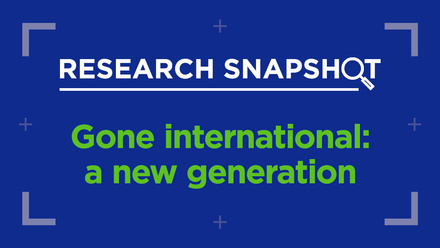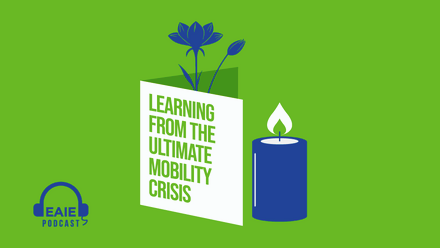Reflective and reflexive writing abroad: Cultural differences as learning tools

Italy is among the most popular non-Anglophone study abroad destinations. Doing coursework there does not guarantee meaningful engagement with local ways of life, however. Indeed, finding oneself in an unfamiliar learning environment may provoke feelings of confusion and anxiety that impact student success. As instructors who teach American students in Italy, we have found that ‘culture shock’ or ‘life shock’ sometimes affects their inclination to engage. Gordon reminds educators that cultural disorientation during study away may ‘lead to hostility and shallow but broad stereotyping’. Listening to students’ descriptions of problematic experiences can open the way for conversations about how social norms vary. This is to say, without being encouraged to reflect on their experiences, non-local students may disengage from their study abroad experience.
Reflective and reflexive writing about their experiences positions them better to learn experientially, engage in local ways of life more enthusiastically, view situations from different viewpoints and explore the unique aspects of their own identities.
In this blog we share techniques that help our students transform their feelings of unsettledness into learning tools. While we teach different subjects – Italian as a second language and anthropology –, we both utilise reflective and reflexive writing assignments to propel students to explore their responses to cultural difference. Reflective and reflexive writing about their experiences positions them better to learn experientially, engage in local ways of life more enthusiastically, view situations from different viewpoints and explore the unique aspects of their own identities.
Use of the terms reflective and reflexive are informed by our respective academic specialties. In concert with Victor Savicki and Michele Price, we consider reflection to be a vital component of student development in cross-cultural educational settings. Reflexivity is a term used in anthropology to refer to intellectual and methodological processes which researchers use to interrogate how their own presence, feelings, activities and self-presentation bear upon interactions with cultural others and shape their interpretations of events. It is associated with a qualitative methodology called participant observation.
If structured opportunities for reflection and reflexivity are not incorporated in lesson plans, they simply may not occur. For example, in a conversation with an American woman who studied in Rome as an undergraduate then returned to Italy for an internship, we asked whether her former teachers had encouraged her to reflect upon or write about her everyday experiences. "Not at all", she replied. She continued:
"I never really reflected on my experiences while I was away, and I certainly didn't write about them. It was after I came home, and even more so now that I am interning, that I made reflection a regular practice. I wish someone had made me do it before. When I was thinking about studying out of my comfort zone, my goals were to get into one of the best American-based programs, have professors whose courses were already on the books so I would get those credits, and basically live in my bubble. I felt like I was making the most out of my time, but I wasn't. I studied the language. I went on group excursions. I had a very good experience. But it didn't really affect me except that it made me want to come back. Now I think hard about cultural differences, about really opening myself to new cultures and not just being alarmed or amused by them. I totally wish my teachers had me think through my experience, not just get through it."
We have found two types of activities especially effective in nurturing reflection and reflexivity among our students. In the first, Italian language learners practice reflection as writers and editors of a student-run/faculty-supervised bilingual online magazine. In the second, interdisciplinary students conduct qualitative, observation-based research projects in Florentine public spaces. The students produce detailed field notes with reflexive components and deliver a final presentation that addresses, in part, how incorporating reflection and reflexivity into the research experience contributed to their understanding of cultural differences and of themselves.
Language was thus treated not as a barrier, but rather as a perspective from which students built a collective story.
Chiaroscuro Magazine
Flourishing abroad requires levels of tolerance that can initially exceed some students’ willingness or ability. To confront this challenge, establishing a writing group where language students can explore their feelings and learn through reflection can be beneficial. One such group established at a school in Florence eventually evolved into the online journal Chiaroscuro. Chiaroscuro refers to the use of light and shade, usually in art, to create depictions of strong contrast. Similarly, the journal’s goal was to be a space where students could discuss, reflect upon, and learn from cultural contrasts. It empowered students to support one another while they reflected more profoundly upon the complexities and contradictions inherent to experiences of travel, gender and self-representation. Submissions were accepted in any language, although students were encouraged to produce bilingual texts. Italian teachers offered editorial assistance. Language was thus treated not as a barrier, but rather as a perspective from which students built a collective story.
The first step was establishing a core team of lead editors and identifying open-source software to create and maintain the journal. Ten student participants were initially selected as an editorial team; that group eventually expanded to twenty-five including several volunteers. The team was reconvened during the first half of each semester, and, in effect, the writing group was an extension of the editorial board. Students embraced their dual roles as authors and reviewers; student reviewers partnered with instructor editors to review submissions and collaborate on every aspect of each issue. Editing and revision occurred in the second half of the semester. The journal was released at the end of each term.
Most essays in the journal adopted the first-person narrator technique. They revealed many dimensions of students’ personal experiences. They also detailed students’ learning processes, which often included marked shifts in attitudes and self-awareness that occurred as part of confronting and reflecting upon linguistic and cultural (mis)understandings. Initial feelings of loss and separation gradually shifted to enhanced self and cultural awareness and new appreciation of difference. Publishing their work enhanced student’s self-esteem by lending a kind of concreteness to the project of self-transformation that had originally inspired many to study in an unfamiliar place.
Ethnography in Italy
Reflectivity is an integral aspect of the anthropological research technique called participant observation, as part of which researchers immerse themselves in study settings for data collection periods ranging from months to years. Writing copious, detailed fieldnotes about one's observations and experiences is fundamental as many anthropologists regard themselves as instruments of research rather than detached observers. At the same time researchers practice reflexivity, assiduously interrogating how their own behaviours, feelings, biases and proclivities affect data collection and analysis.
Reflexivity is a skill that students developed as participants in the interdisciplinary course ‘Ethnography in Italy.’ They were required to conduct participant observation research and write fieldnotes that documented how their own attitudes, behaviours, experiences and culturally-informed expectations affected their interactions while abroad. It became clear that some were quick to draw problematic conclusions about unfamiliar social norms based on one or two experiences. Left unexamined, those conclusions could negatively affect future engagement in local ways of life. To nurture students’ ability to behave and think ‘like ethnographers,’ the course encouraged development of their observational and analytical skills. The course included ‘low stakes’ exercises that reinforced the importance of careful observation and reflexivity. For example, in one exercise, groups of students acted out open-ended cross-cultural social scenarios for their peers that had been described to the ‘actors’ only moments before. As they improvised, classmates took notes. Students later compared their notes and submitted one-page essays that addressed how their own observations compared to those of other classmates. They also addressed how their own identities may have affected their impressions and observations. Over time students gained better understandings of relationships among observation, reflectivity, reflexivity and data-collection. They subsequently conducted their own research over a period of several weeks, for example in coffee shops, museum lobbies or public squares, devoting equal time to observation and writing reflexive fieldnotes. At the end of the semester students gave presentations that addressed both their findings and how reflection and reflexivity had contributed to their learning experience.
Concluding Thoughts
In a 1906 poem describing his experiences in Italy, William Leighton wrote "Through these old streets I wander dreamily; Around me Florence sweeps her busy tide of life". From a pedagogical perspective, it would be easy for many exchange students in Florence and other unfamiliar environments to wander dreamily through entire academic semesters without feeling that they are part of the tide of life. We have found, however, that observation and writing exercises that incorporate reflectivity and reflexivity into the learning process help promote student engagement and learning abroad.






